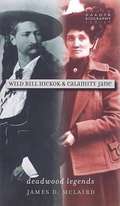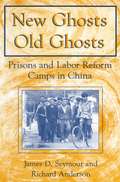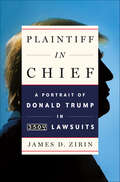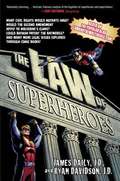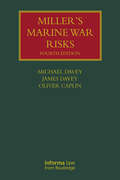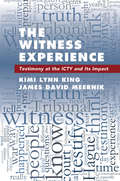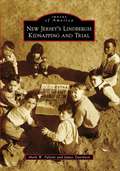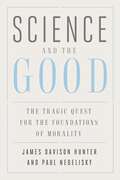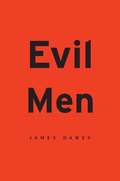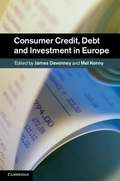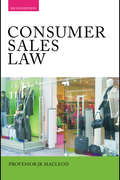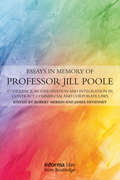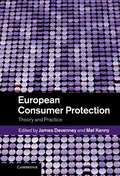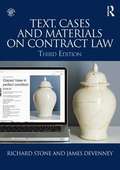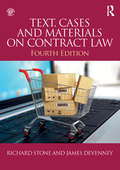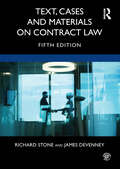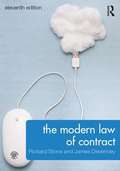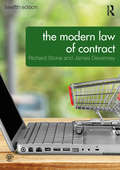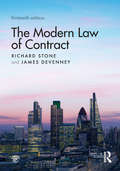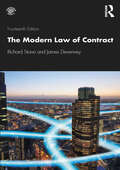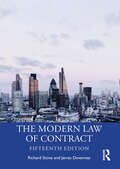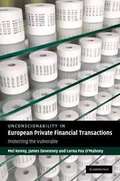- Table View
- List View
Legal Resolution of Nuclear Non-proliferation Disputes
by James D. FryHow viable is the resolution of nuclear non-proliferation disputes through the International Court of Justice and international arbitration? James Fry examines the compromissory clauses in the IAEA Statute, IAEA Safeguards Agreements and the Convention on the Physical Protection of Nuclear Material that give jurisdiction to these fora and analyses recent jurisprudence to demonstrate how legal resolution can handle such politically sensitive disputes. In sum, legal resolution of nuclear non-proliferation disputes represents an option that States and commentators have all too often ignored. The impartiality and procedural safeguards of legal resolution should make it an acceptable option for target States and the international community, especially vis-à-vis the procedural shortcomings and general heavy-handedness of Security Council involvement under UN Charter Chapter VII.
Wild Bill Hickok and Calamity Jane: Deadwood Legends
by James D. Mclaird(back of book) Although Wild Bill Hickok and Calamity Jane spent only a few weeks in Deadwood at the same time, their fame and fate have become intertwined and their relationship legendary. James D. McLaird examines the contemporary accounts that turned these two Wild West wanderers into dime-novel and motion-picture stars. Contemporary novelists and journalists created an astonishingly strong legacy for both Calamity Jane and Wild Bill, accounting for much of their notoriety. Gunfights, scouting missions, and daring escapes from enemies filled stories about the dashing pair; even their day-to-day existence seems to have been fraught with danger and excitement, teetering on the brink between lawful and unlawful. McLaird traces the role that writers and the city of Deadwood itself played in the creation of the legacies of the infamous couple. Fact and fiction have become so woven together that a definitive picture of Calamity Jane and Wild Bill is almost impossible. Their brief friendship and subsequent burial next to each other in Mount Moriah Cemetery simply added to their legendary status and made them stalwarts of Wild West pop culture and Deadwood mythology. Wild Bill Hickok and Calamity Jane: Deadwood Legends is the second book in the South Dakota Biography Series, which highlights some of the state's most famous residents.
Order within Anarchy
by James D. MorrowOrder within Anarchy focuses on how the laws of war create strategic expectations about how states and their soldiers will act during war, which can help produce restraint. The success of the laws of war depends on three related factors: compliance between warring states and between soldiers on the battlefield, and control of soldiers by their militaries. A statistical study of compliance of the laws of war during the twentieth century shows that joint ratification strengthens both compliance and reciprocity, compliance varies across issues with the scope for individual violations, and violations occur early in war. Close study of the treatment of prisoners of war during World Wars I and II demonstrates the difficulties posed by states' varied willingness to limit violence, a lack of clarity about what restraint means, and the practical problems of restraint on the battlefield.
New Ghosts, Old Ghosts: Prisons and Labor Reform Camps in China (Socialism And Social Movements Ser.)
by Michael R Anderson James D. SeymourMuch has been written about the laogai (sometimes likened to the Soviet gulag) in the People's Republic of China. Depending on the source, the prisons are described as nonexistent, enlightened institutions, or hellish places that subject the inmates to degradation and misery. The system is commonly thought of (by admirers and critics alike) as having a measurable impact on the national economy and providing significant resources to the state. Based on research in classified documents and extensive interviews with former prisoners, judicial personnel, and other insiders, and featuring case studies dealing with the three northwestern provinces, this book examines such assertions on the basis of the facts about this underexamined subject in order to arrive at a detailed, objective, and realistic picture of the situation. In the case of each province under study, the authors discuss the history of the provincial prison system and the impact that each has had at the macro, meso, and micro levels.
Plaintiff in Chief: A Portrait of Donald Trump in 3500 Lawsuits
by James D. ZirinA comprehensive analysis of Donald Trump's legal history reveals his temperament, methods, character, and morality. Unlike all previous presidents who held distinguished positions in government or the military prior to entering office, Donald Trump's political worldview was molded in the courtroom. He sees law not as a system of rules to be obeyed and ethical ideals to be respected, but as a weapon to be used against his adversaries or a hurdle to be sidestepped when it gets in his way. He has weaponized the justice system throughout his career, and he has continued to use these backhanded tactics as Plaintiff in Chief.In this book, distinguished New York attorney James D. Zirin presents Trump's lengthy litigation history as an indication of his character and morality, and his findings are chilling: if you partner with Donald Trump, you will probably wind up litigating with him. If you enroll in his university or buy one of his apartments, chances are you will want your money back. If you are a woman and you get too close to him, you may need to watch your back. If you try to sue him, he's likely to defame you. If you make a deal with him, you had better get it in writing. If you are a lawyer, an architect, or even his dentist, you'd better get paid up front. If you venture an opinion that publicly criticizes him, you may be sued for libel.A window into the president's dark legal history, Plaintiff in Chief is as informative as it is disturbing.
The Law of Superheroes
by Ryan Davidson James DailyAn intriguing and entertaining look at how America's legal system would work using the world of comic books. Two brave heroes take on the comic multiverse, wielding the greatest superpower of all: the law. James Daily and Ryan Davidson--attorneys by day, comic enthusiasts all of the time, and founders of the popular website lawandthemultiverse.com--have clearly found their vocation, exploring the hypothetical legal ramifications of comic book tropes, characters, and powers down to the most deliciously trivial detail. The Law of Superheroes asks and answers crucial speculative questions about everything from constitutional law and criminal procedure to taxation, intellectual property, and torts, including: Could Superman sue if someone exposed his true identity as Clark Kent? Are members of the Legion of Doom vulnerable to prosecution under RICO? Do the heirs of a superhero who comes back from the dead get to keep their inherited property after their loved one is resurrected? Does it constitute "cruel and unusual punishment" to sentence an immortal like Apocalypse to life in prison without the possibility of parole? Engaging, accessible, and delightfully educational, The Law of Superheroes is a must-have for legal experts, comic nerds, and anyone who will ever be called upon to practice law in the comic multiverse.
Miller's Marine War Risks (Lloyd's Shipping Law Library)
by James Davey Michael Davey Oliver CaplinMiller's Marine War Risks is the only book devoted to drawing together and analysing the insurance of commercial shipping against war risks. It merges analysis of the legal principles, case law, and legislation with the practice of the insurance market in order to provide commentary on difficult questions concerning liabilities, claims, and coverage. With global events becoming more uncertain in the Gulf and elsewhere, the updating of Michael Miller’s classic text will be of great use to legal practitioners, the insurance market, and the shipping industry throughout the world.
The Witness Experience: Testimony at the ICTY and Its Impact
by King Kimi Lynn Meernik James DavidThis book provides the most comprehensive and scientific assessment to date of what it means to appear before war crimes tribunals. This ground-breaking analysis, conducted with the cooperation of the International Criminal Tribunal for the former Yugoslavia (ICTY) Victims and Witnesses Section, examines the positive and negative impact that testifying has on those who bear witness to the horrors of war by shedding new light on the process. While most witnesses have positive feelings and believe they contributed to international justice, there is a small but critical segment of witnesses whose security, health, and well-being are adversely affected after testifying. The witness experience is examined holistically, including witness' perceptions of their physical and psychological well-being. Because identity (gender and ethnicity) and war trauma were central to the ICTY's mandate and the conflicts in the former Yugoslavia, the research explores in-depth how they have impacted the most critical stakeholders of any transitional justice mechanism: the witnesses.
New Jersey's Lindbergh Kidnapping and Trial (Images of America)
by James Davidson Mark W. FalziniThe kidnapping and murder of Charles Lindbergh Jr. and the subsequent arrest, trial, and execution of Bruno Richard Hauptmann have intrigued true crime buffs for decades. New Jersey's Lindbergh Kidnapping and Trial tells the story of "the case that never dies" through vintage photographs. Rare photographs, many not seen since the 1930s, will allow the reader to experience the massive police investigation led by New Jersey State Police superintendent H. Norman Schwarzkopf and the circus-like trial and execution of Bruno Richard Hauptmann.
Science and the Good: The Tragic Quest for the Foundations of Morality (Foundational Questions in Science)
by James Davison Hunter Paul NedeliskyWhy efforts to create a scientific basis of morality are neither scientific nor moral: &“Important and timely.&”—The Wall Street Journal In this illuminating book, James Davison Hunter and Paul Nedelisky trace the origins and development of the centuries-long, passionate, but ultimately failed quest to discover a scientific foundation for morality. The &“new moral science&” led by such figures as E.O. Wilson, Patricia Churchland, Sam Harris, Jonathan Haidt, and Joshua Greene is only the newest manifestation of that quest. Though claims for its accomplishments are often wildly exaggerated, this new iteration has been no more successful than its predecessors. But rather than giving up in the face of this failure, the new moral science has taken a surprising turn. Whereas earlier efforts sought to demonstrate what is right and wrong, the new moral scientists have concluded, ironically, that right and wrong don&’t actually exist. Their (perhaps unwitting) moral nihilism turns the science of morality into a social engineering project. If there is nothing moral for science to discover, the science of morality becomes, at best, a feeble program to achieve arbitrary societal goals. Concise and rigorously argued, Science and the Good is a definitive critique of a would-be science that has gained extraordinary influence in public discourse today—and an exposé of that project&’s darker turn. &“Science and the Good is a closely argued, always accessible riposte to those who think scientific study can explain, improve or even supersede morality . . . A generous and thoughtful critique.&” —The Daily Telegraph
Evil Men
by James DawesA searching meditation on our all-too-human capacity for inhumanity, Evil Men confronts atrocity head-on-how it looks and feels, what motivates it, how it can be stopped. James Dawes’s unflinchingly honest account, drawing on firsthand interviews, is not just about the things Japanese war criminals did, but about what it means to befriend them.
Consumer Credit, Debt and Investment in Europe
by Mel Kenny James DevenneyProduced under the auspices of an EU-funded Marie Curie research programme, this volume analyses vulnerability in European private law and scrutinises consumer protection in credit and investments in the context of the recent turmoil in financial markets and EU harmonisation initiatives in the area. It explores key issues such as responsible lending, the disclosure of information, consumer confidence, the regulation of consumer investment services and the protection of bank depositors. The chapters emanate from the 'Consumer Protection in Europe: Theory and Practice' duo colloquium which explored consumer protection in Europe in its theoretical and practical dimensions. These topics are even more relevant today given the passage of the Consumer Rights Directive, the appointment of an Expert Group on a common frame of reference, the Green Paper on European Contract Law and the ongoing deliberations surrounding the Common European Sales Law.
Consumer Sales Law: The Law Relating to Consumer Sales and Financing of Goods
by James Devenney John MacleodFully updated and revised, this comprehensive and informative textbook provides readers with an overview of current consumer sales law and equips them with a view of how this fast-changing subject has, and will continue to develop through the inclusion of new reform proposals. This book analyzes the interaction of consumer sales law with politics, the appeal of consumer protection to politicians and the influence of the European Union and the EU Directives. It also discusses the removal of consumer sales law from its traditional realm of legal professionals to consumer and debt advisors and public officials with the power to seek injunctions to protect consumers. In addition to this, it: fully integrates both the Unfair Commercial Practices Directive 2005 and the Consumer Credit Act 2006 into the basic 1974 Act explains how the sale of Goods Act 1979 has been modified by the 1999 Directive combines the public protection of consumers under the Enterprise Act 2002 (e.g. Office of Fair Trading) is supplemented by comprehensive e-updates on its Companion Website, keeping the content current between editions. Written by an author with forty years experience of teaching sales and finance law to undergraduates, this textbook is an essential tool for all undergraduates studying commercial and consumer sales law.
Essays in Memory of Professor Jill Poole: Coherence, Modernisation and Integration in Contract, Commercial and Corporate Laws
by James Devenney Robert MerkinThis book is a collection of original, thought-provoking essays on critical issues in contract, commercial and corporate law. It is dedicated to the memory of the late Professor Jill Poole, who inspired so many and made such important contributions to these fields of law. The essays are written by leading practitioners and academics in the field, building on Jill’s work. As such this collection will be of interest and importance to professionals, academics and students in these fields of law. The Professor Jill Poole Educational Fund has been established in memory of Jill. It will be used to support undergraduate students in obtaining 'excellence scholarships' at Aston Law School and to reward 'excellence' at the annual law graduation ceremony. All contributions are welcome, and the royalties from this collection of essays have been donated to it.
European Consumer Protection
by Mel Kenny James Devenney"This volume analyses the theory and practice of European consumer protection in the context of consolidation initiatives seen, inter alia, in the revision of the Consumer Acquis, the Draft Common Frame of Reference and the proposal for an EU Consumer Rights Directive. The issues addressed are all the more significant given the revisions to the proposed Directive, the appointment of an 'Expert Group on a Common Frame of Reference' and the Commission's 2010 Green Paper on progress towards a European Contract Law. The contributions to this volume point to the arrival of a contested moment in EU consumer protection, questioning the arrival of the 'empowered' consumer and uncovering the fault lines between consumer protection and other goals. What emerges is a model of poly-contextual EU consumer protection law, a model that challenges the assumptions in both the 2010 Green Paper and the revised proposed Consumer Rights Directive"--
Text, Cases and Materials on Contract Law
by James Devenney Richard StoneComposed of approximately one-quarter authors' commentaries and three-quarters cases and materials, including academics' articles and extracts from books and Law Commission papers, this book facilitates the development of personal study skills and encourages readers to engage with the leading commentaries in the area. Clearly signposted chapter introductions highlight the salient features under discussion and additional reading collected at the end of each chapter guides further study and independent research. The range of material covered and the straightforward style makes Text, Cases and Materials on Contract Law an invaluable resource for all undergraduate students of contract law.
Text, Cases and Materials on Contract Law
by James Devenney Richard StoneWritten by leading authors in the field, this clear and highly accessible volume provides full coverage of the topics commonly found in the contract law syllabus, alongside up-to-date illustrative case examples and stimulating commentary. Composed of approximately one-quarter authors’ commentaries and three-quarters cases and materials, including academics’ articles and extracts from books and Law Commission papers, this book takes account of a variety of theoretical perspectives, including economic, relational and empirical conceptions of the law. This book facilitates the development of personal study skills and encourages readers to engage with the leading academic commentaries in the area. Features to support your learning include: ? chapter introductions to highlight the salient features under discussion and signpost topics to guide readers through this comprehensive text; ? additional reading listed at the end of each chapter to assist further study and independent research; ? clear and attractive text design that differentiates between the authors’ commentaries and the materials; ? a companion website that provides skills materials and self-assessment tasks to help further your learning. The range of material covered, straightforward style and targeted updates to this fourth edition make Text, Cases and Materials on Contract Law a comprehensive and invaluable resource for all undergraduate and postgraduate students of contract law.
Text, Cases and Materials on Contract Law
by James Devenney Richard StoneWritten by leading authors in the field, this clear and highly accessible volume provides full coverage of the topics commonly found in the contract law syllabus, alongside up-to-date illustrative case examples and stimulating commentary. Composed of approximately one-quarter authors’ commentaries and three-quarters cases and materials, including academics’ articles and extracts from books and Law Commission papers, this book takes account of a variety of theoretical perspectives, including economic, relational and empirical conceptions of the law. This book facilitates the development of personal study skills and encourages readers to engage with the leading academic commentaries in the area. Features to support your learning include: chapter introductions to highlight the salient features under discussion and signpost topics to guide readers through this comprehensive text; additional reading listed at the end of each chapter to assist further study and independent research; clear and attractive text design that differentiates between the authors’ commentaries and the materials; a companion website that provides skills materials and self-assessment tasks to help further your learning. The range of material covered, straightforward style and targeted updates to this fifth edition make Text, Cases and Materials on Contract Law a comprehensive and invaluable resource for all undergraduate and postgraduate students of contract law.
The Modern Law of Contract
by James Devenney Richard StoneThe Modern Law of Contract is a clear and logical textbook, written by an experienced author team with well over 30 years' teaching and examining experience. Offering a carefully tailored overview of all key topics for LLB and GDL courses, this eleventh edition has been thoroughly updated. The book also includes a number of learning features designed to enhance comprehension and aid exam preparation, including: Understand and remember core topics: boxed chapter summaries offer a useful checklist for students, while illustrative diagrams help to clarify difficult concepts; Identify important cases and assess their relevance: 'Key Case' features highlight and contextualise the most significant cases; Reflect on how contract law operates in context: highlighted 'For thought' features ask students to consider 'what if' scenarios, while 'in focus' features offer critical commentary on the law; Consolidate learning and prepare for assessment: further reading lists and comparison website directions at the end of each chapter direct you to additional interactive resources to test and reinforce your knowledge. Clearly written and easy to use, The Modern Law of Contract enables undergraduate students of contract law to fully engage with the topic and gain a profound understanding of this fundamental area.
The Modern Law of Contract
by James Devenney Richard StoneThe Modern Law of Contract is a clear and logical textbook, written by an experienced author team with well over 50 years’ teaching and examining experience. Fully updated to address the Consumer Rights Act 2015 and recent key cases in Contract Law, it offers a carefully tailored overview of all key topics for LLB and GDL courses. The book also includes a number of learning features designed to enhance comprehension and aid exam preparation, allowing the reader to: ? understand and remember core topics: boxed chapter summaries offer a useful checklist for students, while illustrative diagrams help to clarify difficult concepts; ? identify important cases and assess their relevance: ‘Key case’ features highlight and contextualise the most significant cases; ? reflect on how contract law operates in context: highlighted ‘For thought’ features ask students to consider ‘what if’ scenarios, while ‘in focus’ features offer critical commentary on the law; ? consolidate learning and prepare for assessment: further reading lists and comparison website directions at the end of each chapter direct you to additional interactive resources to test and reinforce your knowledge. Clearly written and easy to use, The Modern Law of Contract enables undergraduate students of contract law to fully engage with the topic and gain a profound understanding of this fundamental area.
The Modern Law of Contract
by James Devenney Richard StoneThe Modern Law of Contract is a clear and logical textbook, written by an experienced author team with well over 50 years’ teaching and examining experience. Fully updated to address recent developments in Contract Law, it offers a carefully tailored overview of all key topics for LLB and GDL courses. The book also includes a number of learning features designed to enhance comprehension and aid exam preparation, allowing the reader to: ■■ understand and remember core topics: boxed chapter summaries offer a useful checklist for students, while illustrative diagrams help to clarify difficult concepts; ■■ identify important cases and assess their relevance: ‘Key case’ features highlight and contextualise the most significant cases; ■■ reflect on how contract law operates in context: highlighted ‘For thought’ features ask students to consider ‘what if’ scenarios, while ‘In focus’ features offer critical commentary on the law; ■■ consolidate learning and prepare for assessment: further reading lists and companion website directions at the end of each chapter direct you to additional interactive resources to test and reinforce your knowledge. Clearly written and easy to use, The Modern Law of Contract enables undergraduate students of contract law to fully engage with the topic and gain a profound understanding of this fundamental area.
The Modern Law of Contract
by James Devenney Richard StoneWritten by an author team with over 60 years of teaching experience, the new edition of The Modern Law of Contract is the complete textbook for students of contract law, providing not only clear and authoritative commentary but also a selection of learning features to enable students to engage actively with the law. This, the 14th edition, has been fully updated to address recent developments in contract law, including the implications of COVID-19 and the UK’s future relationship with the EU. It offers a carefully tailored overview of all key topics for LLB and GDL courses, and includes a number of learning features designed to enhance comprehension and aid exam preparation, including: boxed chapter summaries that offer a useful checklist for students, and illustrative diagrams to clarify difficult concepts; ‘Key cases’ that highlight and contextualise the most significant cases; ‘For thought’ features that ask ‘what if’ scenarios; ‘In focus’ features that provide critical commentary on the law. Also including further reading at the end of each chapter, and a companion website with additional resources, The Modern Law of Contract enables undergraduate and postgraduate students not only to fully understand the essential details of contract law but also to develop a profound and critical understanding of this fundamental area.
The Modern Law of Contract
by James Devenney Richard StoneWritten by an author team with over sixty years of combined teaching experience, the new edition of The Modern Law of Contract is the complete textbook for students of contract law, providing not only clear and authoritative commentary but also a selection of learning features to enable students to engage actively with the law.The 15th edition has been fully updated to address recent developments in contract law, including the Supreme Court judgments in Sara & Hossein Asset Holdings Ltd v Blacks Outdoor Retail Ltd [2023] UKSC 2, Triple Point Technology, Inc v PTT Public Company Ltd [2021] UKSC 29, Barton v Gwyn-Jones [2023] UKSC 3 and Pakistan International Airline Corp v Times Travel (UK) Ltd [2021] UKSC 40. It offers a carefully tailored overview of all key topics for LLB and GDL courses, and includes a number of learning features designed to enhance comprehension and aid exam preparation, including: boxed chapter summaries that offer a useful checklist for students, and illustrative diagrams to clarify difficult concepts ‘Key cases’ that highlight and contextualise the most significant cases ‘For thought’ features that ask ‘what if’ scenarios ‘In focus’ features that provide critical commentary on the law Also including further reading at the end of each chapter and digital learning resources, The Modern Law of Contract enables undergraduate and postgraduate students not only to fully understand the essential details of contract law but also to develop a profound and critical understanding of this fundamental area.
The Transformation of European Private Law
by James Devenney Mel B. KennyThis book emanates from a duo-colloquium which explored the Europeanisation of private law in the context of efforts to consolidate the consumer acquis, the Draft Common Frame of Reference, the appointment of an Expert Group on a Common Frame of Reference in the area of European contract law, the passage of the Consumer Rights Directive and the proposed Common European Sales Law. This book, with fully updated contributions, critically reflects on whether the process of Europeanisation, which has shaped private law in the EU Member States, has now reached a significant turning point in its development, a point of punctuated equilibrium. Written by a team of leading authors, the topics covered will be of concern in all European legal systems and beyond.
Unconscionability in European Private Financial Transactions
by Mel Kenny James Devenney Lorna Fox O'MahonyGiven the unprecedented recent turmoil on financial markets we now face radically challenged, 'post-Lehmann' assumptions on protecting the vulnerable in financial transactions. This collection of essays explores conceptions of, and responses to, unconscionability and similar notions across Europe with specific reference to financial transactions. It presents a detailed analysis of concepts of unconscionability in Europe against a backdrop of Commission initiatives aimed, variously, at securing a single market in financial services, producing greater coherence in EC consumer protection law and consolidating European private law. This analysis illustrates, for example, that concepts of unconscionability depend on context and can be shaped by a variety of factors. It also illustrates that jurisdictions may choose to respond to questions of unconscionability through a variety of legal instruments located in different branches of the law rather than through a single doctrine. Thus this collection illuminates many of the obstacles facing harmonisation in this area.

